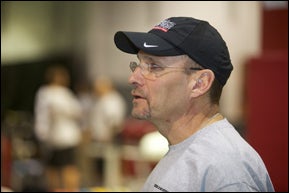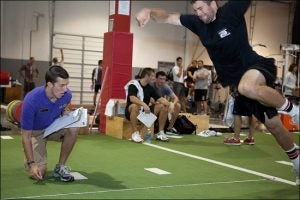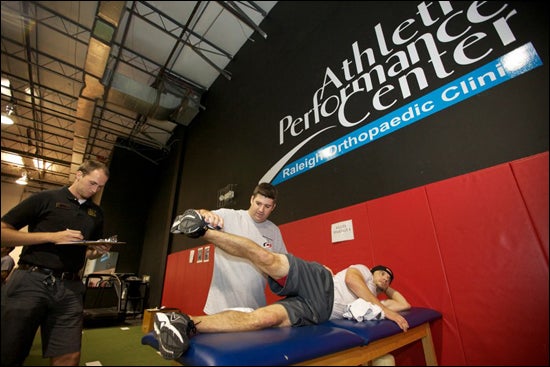On center ice
ECU physical therapy assesses Carolina Hurricanes hockey players during training camp
As competition intensifies for coveted spots on the Carolina Hurricanes hockey team, East Carolina University physical therapy faculty and students helped assess players’ readiness the first day of training camp Sept. 16.
ECU clinical assistant professor Kevin Youngs and eight students evaluated 56 players from at least six countries invited to camp. There were a range of tests to measure strength and endurance, flexibility and cardiovascular fitness. The Hurricanes will take about 28 players. Others will go to the Hurricanes’ American Hockey League affiliate, the Charlotte Checkers, or other minor league assignments.
At training camp, students had a rare opportunity to work with professional athletes and trainers. Two students, Lee Welch of Greenville and Matt Lisk of Mount Airy, will serve as game day assistants during the upcoming season. Both are interested in working with athletes after graduation.
“I did some athletic training as an undergraduate,” Lisk said. “This will definitely be a good experience.”

Hurricanes head trainer Peter Friesen will analyze data gathered during assessments.
At a station labeled “glute strength,” players stretched out on an exam table where Youngs used a handheld dynamometer to measure force and strength in the players’ outer and inner thighs. He also checked range of motion. Doctoral student F.J. Goodwin of Winterville recorded the numbers.
The muscles are important because of the explosive side-to-side movement of skating. Injuries to the hip and hamstrings can be debilitating.
“It goes back to stability,” Youngs said. “If they have a weakness in the hip, we will see asymmetry. We really want to see if there is major asymmetry, and how it correlates to any injury in the past, and what they can work on in season and the off season to prevent injury in the future.”
Keeping players healthy
This is the second year ECU physical therapy has worked with the Hurricanes as part of a research study on risk factors and prevention of groin injuries. Athletes were tracked last season and followed during the offseason with recommendations to improve performance and prevent injury. Data from this year’s pre-season will be added, analyzed and given to Carolina Hurricanes head trainer Peter Friesen.
He likened hockey players to “skating on high heels” because of the blade height.
“Agility, speed and balance are the upmost importance,” Friesen said. Some hits compare to a car crash, with opposing players reaching skate speeds close to 30 mph. Keeping players healthy is critical since they have three to four games per week – a total of 82 in the regular season – and travel 75,000 miles a year across 13 time zones.
“It is a long season,” Friesen said. “I think this is the hardest sport to train for because of the body contact and physical demands of the league.”
Jaime Holt (’99) is a physical therapist at Athletic Performance Center, part of Raleigh Orthopedics, who works with the Hurricanes team and helped facilitate the ECU-Hurricanes partnership.
Gone are the days when players could show up at camp and get in shape. “They train a lot in the off season,” Holt said. “My job is to keep the injuries down.”
In season, he sees groin pulls and lower back pains, and the occasional shoulder dislocation or concussion. The pre-season allows time to identify players with a weakness or imbalance and get the player on a program to prevent injury on the ice.
“It’s a physical sport,” Holt said. “A lot of times injuries happen when they are worn out. So the better conditioned they are, the less prone to injury they are. When you’re tired, technique and form break down, and you get mentally lazy.”
Off-season conditioning means dry land training. Players can’t continually train on ice because of stress to the knees. “Cardio, strength and flexibility are all done off ice,” said Friesen, adding hockey players do cross training with weights, bikes and balls to maintain sharp hand and eye coordination.
A new season
ECU students Welch and Lisk are already preparing for the start of the regular professional hockey season.
Brandon Sutter, a center and assistant captain of the Hurricanes, said having the ECU students around the rink is a positive experience. “They help us out in a lot of ways,” Sutter said. “When a guy helps you take care of your body, it helps you with your performance, which is first and foremost.”
Friesen said the strong relationship with ECU helps him stay on the cutting edge of research. ECU values the partnership, too.
“The Department of Physical Therapy is very pleased to have a relationship with the Carolina Hurricanes,” said Dr. Walt Jenkins, chair of ECU physical therapy.

ECU student Matt Lisk monitors a jump performed by player Chris Durno. Lisk will serve as game day assistant during the Hurricanes’ season.
